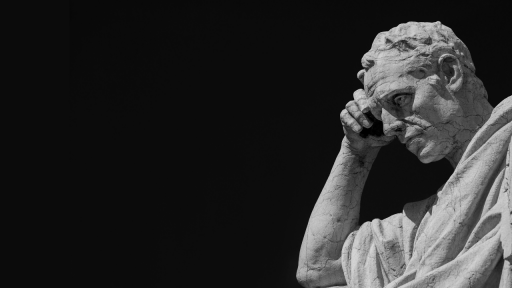A few days ago, I posted the following question on a large private Facebook group that discusses matters relating to philosophy, theology and religion:
Question for agnostics/atheists: What kind of evidence/proofs would you require in order to believe in God?
I was genuinely interested in the responses I would receive. After all, the search for God is one that has consumed human thought for centuries, even millennia. To know how to go about the process is surely the first step in discovering for oneself the answer to the question, does He truly exist?
The first response I got was four words long, ‘The god would know.’ Despite its brevity, many replies followed which agreed with this statement: ‘At this point, I don’t know what would convince me, but if an all-powerful god exists, and that god desired me to believe in its existence it would be impossible for me not to know.’ Other replies quickly followed. ‘The compelling kind,’ one group member wrote. Several other responses were of similar vein: ‘The indubitable kind.’ Some were more specific: ‘Testable, repeatable, falsifiable, independently verifiable evidence that only points to one god with no other explanation possible.’ Here’s another: ‘A small first step would be an absolutely 100% verifiable instance of a genuine supernatural event occurring anywhere, an event that completely defied any scientific explanation or cause. Until that happens, I’m not even going to bother considering the remote possibility of a supernatural, all powerful, supreme being(s).’
A few replies suggested miracles that could take place that might convince them: ‘Unedited, independently verified footage of a regrowing human limb, with the new blood vessels spelling out ‘Yahweh was here?’
One simply replied with a GIF of an exasperated man with the caption ‘THERE IS NO GOD.’

In general, there was a definite pattern to the responses, all of which fell into one of three distinct categories. They can be summed up as follows:
1. That the onus is entirely on God in making himself discoverable.
2. That only compelling/indubitable evidence will be accepted, nothing short of that.
3. A miracle of the atheist’s choosing must take place in order to believe.
When I reflected upon these criteria that the atheists laid out in response to my question, I asked myself whether they were being unfair, and also whether they would apply similar criteria to all their other academic or scientific pursuits?
When it came to it, I need to look no further than myself. When I was a first-year medical student, we had a small group teaching session on alcoholism. At the end of a session, the tutor read out a case history, of a 70-year-old patient who had been a severe alcoholic and developed memory problems. On the surface, he seemed fine, well dressed, well spoken, polite. But on speaking to him it became apparent that he believed he was currently in the 1960s. His thoughts were focused on the Cold War, his student woes and his grandfather’s recent illness. He was unable to form new memories, and so when the doctor spoke to him, left for a while and came back, the patient was completely unable to remember that he had ever seen the doctor before. Our tutor told us that this disorder was called Korsakoff’s Psychosis, caused by vitamin and mineral deficiency as a result of heavy alcohol use.
However, using the philosophy of the atheist, I decided I didn’t believe that such a condition existed. It was just too far-fetched for me. After all, I had never seen a patient with it in real life, and I definitely wasn’t just going to believe whatever was on a sheet of paper, or told to me by a so-called expert. No, I wouldn’t be brainwashed so easily.
Five years later, as a junior doctor, whilst working on the wards, I met a patient with this ‘Korsakoff’s Psychosis’, displaying very similar symptoms to those I had read about half a decade earlier. You must think I felt quite the fool, for disbelieving all this time. Actually, no, I still disbelieved. Why? Because other explanations were still possible. Perhaps the patient in front of me was faking it. Maybe I was hallucinating. I wasn’t going to bother considering the remote possibility of such an extraordinary condition. It just wasn’t compelling enough, I’m afraid.
So why am I telling you this entirely serious story? It is to demonstrate that atheists use a different set of criteria when assessing the validity of a scientific hypothesis, as compared to the hypothesis of God’s existence. When we are given a lecture on a scientific concept, we do not immediately disbelieve in it because we haven’t seen or experienced it for ourselves. Rather we accept the claim that is made, simply because it given to us by an expert. We trust them, out of a type of informed faith. Why not do the same with the thousands and thousands of individuals, truthful in their everyday life, who claimed that they have had some kind of divine experience? Why not do this especially for the founders of religion, who are renowned to have been the most truthful and sane people in their societies?

Now I know what you’re thinking. Extraordinary claims require extraordinary evidence. This is the maxim of many a modern-day atheist, lifted from Carl Sagan and deployed at every opportunity. The only problem with it is that what is extraordinary to one person is perfectly reasonable to another. Take the existence of Korsakoff’s syndrome. This is an extraordinary, and quite unbelievable condition at first glance. Based on the claim that extraordinary claims require extraordinary evidence, should I have believed in its existence on the basis of seeing one or two patients and reading about it in medical scripture? Or should I have waited to see a thousand patients, studied in detail their case histories, and then awaited a post-mortem examination of their brain?
You see, belief in God may be extraordinary to someone born in the secular modern west, but it is perfectly ordinary to others born in different times and places. Does this mean the standard of evidence needed to believe in God should change based on circumstance?
Of course not. Rational belief should not be dependent on our subjective feelings for that belief. There is either good evidence for God or there is not. Instead of awaiting extraordinary evidence for God, we should look for sufficient evidence for the existence of God. Any claim requires sufficient evidence is a far better maxim than Sagan’s, though it is decidedly less catchy.
What decides how much evidence is sufficient? Ultimately, be it in science or metaphysics, that is an individual decision. However, personal decisions can also be externally justified. The first step is to do away with preconceptions, and treat the existence of God as a scientific hypothesis. In science, we do not reject hypotheses because the evidence in their favour is not 100% compelling, or because the evidence was not gathered in exactly the way we would like it to have been. Instead, we accept things on the balance of probability. It is more likely than not that this intoxicant is causing this brain disorder. Therefore, we will believe in it and treat it as such. As times goes on, the clinicians who initially treated Korsakoff’s Psychosis as being real on the balance of probability, had their suspicions confirmed time and again through the clinical experience of repeated observation. Over time, their probabilistic belief became something closer to an experienced certainty.
Surprisingly to some, this is exactly the path that religion asks us to go down. It asks us first to assess if it is likely or not that God exists. To do this, it asks us to consider the sudden origin of the universe, the incredibly improbable nature of the universe, and the evolution of life on Earth. Could all this have happened by mindless, impersonal forces? Or is it better explained by believing in a universal consciousness that is a Creator and Designer?
Having begun with a theoretical belief, religion then invites us to enter the field of spirituality. Through this, we can find certainty through experience, like medical students moving from their books into the world of clinical medicine. In doing so, our theoretical knowledge will be confirmed over and over. With each new patient we see, our belief in medical scripture becomes more and more justified in our minds. In the search for God, we can do this by following the path that all Godly people suggest – through prayer, good deeds, patience and striving. It is then that we see God answering our prayers, sending upon us revelation, and guiding our life in a way that cannot be explained without Him.
The search for God in the way I have described is not unscientific, or anti-scientific. Rather it is based on the principle that every hypothesis has its own methods of confirmation, its own means of being proved true. The principles of science remain the same – make an observation (for example, the nature of the universe), form a question, establish a hypothesis, conduct an experiment, analyse the data and draw a conclusion. When it comes to God, the path laid out by the spiritual experts of yore is this – look at the world around you and see signs of God’s existence. Then undergo spiritual exertion and have this theoretical belief confirmed as true through experience.
There is, in reality, no other way. What atheists often want to do is to put God into a test tube. But a God who reveals himself through this method of experimentation would be, by definition, finite, and thus not worth even believing in. Some want specific miracles to take place, of their choosing, before they believe. Again, a God that we can control, a God that is our slave, at the whim of our every command, is also one not worth believing in or worshipping. We have to prove ourselves to God – not the other way around.
It should be clear by now that while atheists consider themselves the flag-bearers of logic, reason, fairness, and scientific rigour, when it comes to God, their attitude is deliberately biased. The level of proof that they require in order to believe in God is much higher than the level of proof that they require for anything else. In reality, this attitude more closely resembles the attitude of flat-earthers than acclaimed scientists.
How do I know this? Well, because I spent some time on the ‘Official Flat Earth and Globe’ discussion group on facebook. I even tried posting the question – what kind of evidence would convince you that the earth is round? However the administrator blocked it, pointing me to an almost identical question that had been asked a few weeks earlier:
To the flat earthers; if circumnavigation of the earth, eclipse of the sun, ship visibility, etc would not convince you of a spherical earth, what else would convince you?
The predominant reply was something along the lines of ‘a spherical earth,’ or ‘maybe some curvature…I don’t know call me crazy.’ Another replied ‘What does a solar eclipse have to do with anything? Please return to earth and show me the curve.’
Essentially the point they were making was: ‘We won’t believe in a spherical earth until you show us a spherical earth.’ When evidence of some sort was pointed out to them they either outright denied it without actually engaging with the point made, or demanded their own specific proofs. One user wouldn’t believe until he saw ‘a video of NASA in space doing a live feed where they turn the camera 360 degrees.’ He added, ‘Never happen because its filmed in a studio, airplane or pool. 180 degree turn would prove the lack of the 4th wall. Mic drop gloobers!

Like those atheists who answered my God question, the flat-earthers also:
1. Refused to believe the other side of the argument because their own (limited) vantage point meant that they couldn’t physically see what their opponents were describing.
2. Provided very specific, often unrealistic experimental demands, while rejecting (often off-hand) testimonies, experiments already conducted, or other kinds of evidence.
3. Wanted far more compelling evidence than is reasonable, often due to pre-existing dogmatic attitudes.
I do not think that the views of atheists are as absurd as those of flat-earthers. Not at all. Many atheists are highly intelligent, and experts in worldly affairs. However, when it comes to God, they fail to use the same analytical skills that they possess when considering other issues.
It could be argued that many religious people, including Muslims, are also closed-minded, and this is indeed the case. However, this attitude is in spite of the Quran, not because of it. In fact, the only time the Quran talks about people believing in something because it is the cultural norm, is when describing those who don’t believe in the Prophets of God:
And when Moses came to them with Our clear Signs, they said, ‘This is nothing but sorcery devised, and we never heard the like of this among our forefathers.’ (28:37)
It condemns people who do not use reason and rationality to determine the truth:
And He makes His wrath descend on those who will not use their reason. (10:101)
The Quran challenges the reader to strive to find God, rather than simply self-identifying as a follower of Islam:
‘The Arabs of the desert say, ‘We believe.’ Say ‘You have not believed yet; but rather say, ‘We have accepted Islam,’ for the true belief has not yet entered into your hearts. (49:15).
Moreover, the Quran promotes belief born of deep reflection and intellectual effort:
In the creation of the heavens and the earth and in the alternation of the night and the day there are indeed Signs for men of understanding; Those who remember Allah while standing, sitting, and lying on their sides, and ponder over the creation of the heavens and the earth: “Our Lord, Thou hast not created this in vain; nay, Holy art Thou; save us, then, from the punishment of the Fire.” (3:191-192)
The Quran also strongly condemns dogmatism. Rather it promotes accepting truth, regardless of how inconvenient it may be. God tells the Prophet Muhammad of the attitude that one should take when considering whether to accept a faith:
‘Say, ‘If there had been a son to the Gracious God, I would have been the first of worshippers.’’ (43:82).
Such a philosophy, which stands at the heart of Islam, of being willing and ready to submit to whatever is true, regardless of egoism and preconception, is one that many atheists would benefit in adopting today.
A final note. When asked what evidence would be required to accept the opposing view, one response was common to both facebook groups, written in similar words: ‘The kind of evidence you couldn’t provide.’
Ah well.










5
Jazakallah for such a nice article. I cannot express my gratitude for publishing such beautiful and well-written articles about Aehtisim. Please continue your efforts. May God be with all of you and reward all of you for your efforts.
JazakAllah!
I don’t see much point in trying to reason with someone like you who is immune to reason.
4.5
Prophet Muhammad (sa)
(Peace and blessings of Allah be upon him) after Prophet Muhammad